WASHINGTON, D.C. -- Residents of Gulf Coast-facing counties continue to suffer from lower overall emotional health, as measured by the Gallup-Healthways Emotional Health Index, in the two years since the BP oil spill in the Gulf of Mexico. Those living in non-Gulf states and inland counties in the same Gulf Coast-facing states have shown no such drops in Emotional Health Index scores in the aftermath of the oil spill.
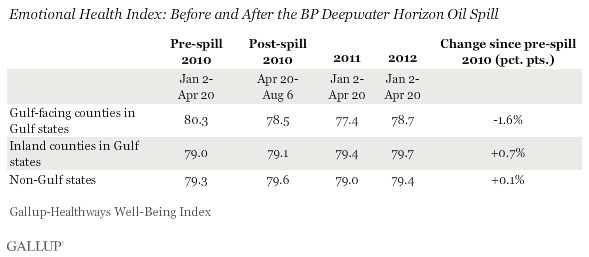
For residents living in Gulf Coast-facing counties, changes in Emotional Health Index scores of the magnitude shown in the graph are statistically significant and meaningfully large.
These findings are based on more than 1,200 interviews conducted in each of four measurement periods, dating to the 15-week period immediately preceding the BP oil spill, with residents of 25 Gulf Coast-facing counties in Louisiana, Mississippi, Alabama, Florida, and Texas. During the same four periods, more than 15,000 interviews were conducted with residents of the inland counties of Gulf Coast states and about 90,000 were conducted in each non-Gulf state as a part of the Gallup-Healthways Well-Being Index.
The Emotional Health Index is one of six sub-indexes that make up the Gallup-Healthways Well-Being Index, and it includes 10 individual items. Several of these items, such as daily worry, stress, sadness, and clinical depression, provide insight into the potential negative emotional health effects of the oil spill in the Gulf of Mexico.
Depression Diagnoses Up in Gulf Coast Counties in 2012 vs. Pre-Spill 2010
Residents of Gulf Coast-facing counties were 31% more likely to report having ever been diagnosed with depression in January through April 2012 than they were in the same time period before the oil spill. It is important to note that Gallup asks this question in regards to a diagnosis occurring at any point in the respondent's life, and it does not necessarily imply that the oil spill itself created new depression cases. Still, the notable increase in depression diagnoses reveals that these diagnoses among residents along the Gulf coastline have climbed at a time when they were statistically unchanged throughout the rest of the country, and they have actually slightly declined in inland counties in the five Gulf states.
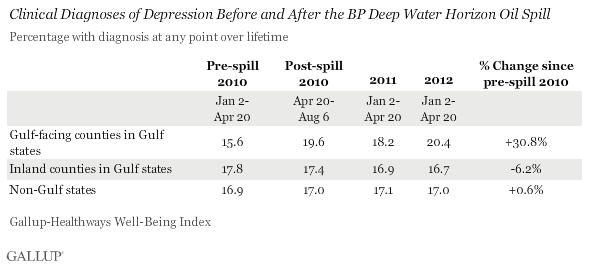
The Well-Being Index also measures daily mood in terms of stress, worry, and sadness residents report experiencing "a lot of the day yesterday." Across each of these daily mood metrics, residents of Gulf Coast-facing counties have experienced measurable increases in these negative emotions that their inland counterparts and residents of non-Gulf Coast states have not.
Residents living in Gulf Coast-facing counties were much likely to report stress, worry, and sadness two years after the oil spill than they were before it. However, after peaking in the winter/spring of 2011, residents' negativity has since declined, falling in 2012 to the lowest levels since the initial, pre-spill period. Thus, while the negative emotional toll of the oil spill is still apparent, things appear to be getting better for residents most immediately affected by it.
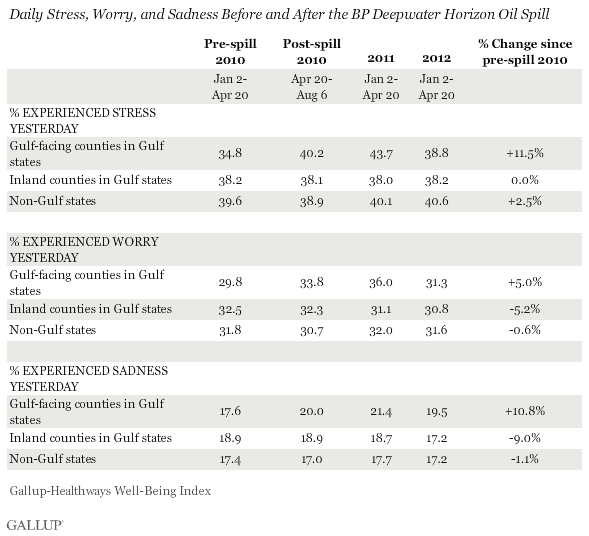
City Satisfaction and Optimism Partially Recovering
Gulf Coast residents' views of their communities have also suffered since the BP oil spill. Gulf-facing residents' satisfaction with the city or area where they live and optimism that it is getting better as a place to live both declined in the immediate aftermath of the spill. However, as with stress, worry, and anger, these metrics have shown some improvement since that time.
Additionally, as with the other emotional health metrics, Gallup has not found the same declines in city/area satisfaction among respondents who live further inland, and the percentage of residents who see their area getting better has actually improved modestly outside of the Gulf-facing counties.
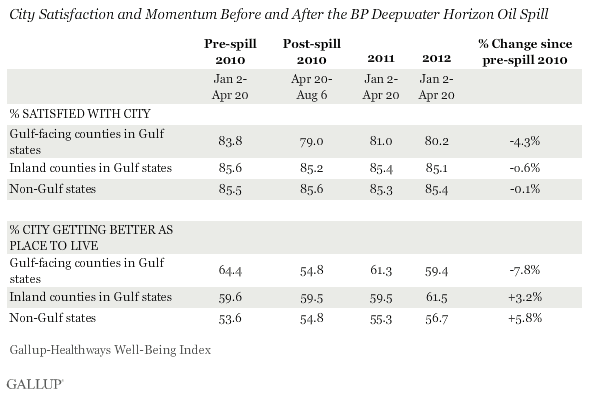
Implications
Taken together, these data document the extent to which residents living alongside the Gulf of Mexico continue to suffer a decrease in emotional health and satisfaction with their communities since the BP oil spill, as Gallup originally reported in 2010. Similar declines in these measures are not seen among residents living further inland. These findings provide supporting evidence that whatever improvements have been made to the physical environment of the Gulf area, the damage to residents' emotional health continues to persist. Encouraging recent trends in Gallup data, however, seem to indicate that the psychological fallout of the oil spill may be easing.
About the Gallup-Healthways Well-Being Index
The Gallup-Healthways Well-Being Index tracks well-being in the U.S., U.K., and Germany and provides best-in-class solutions for a healthier world. To learn more, please visit well-beingindex.com.
Survey Methods
Results are based on 1,359 interviews conducted as part of the Gallup-Healthways Well-Being Index survey Jan. 2-April 20, 2010, 1,239 interviews April 21-Aug. 6, 2010, 1,245 interviews Jan. 2-April 20, 2011, and 1,306 interviews Jan. 2-April 20, 2012, with residents of 25 Gulf Coast-facing counties from the states of Louisiana, Mississippi, Alabama, Florida, and Texas. In addition to the collection of these data, about 15,000 interviews were conducted each time period with residents of inland counties of Gulf Coast states and about 90,000 interviews were conducted each period with non-Gulf states as a part of the Gallup-Healthways Well-Being Index.
For results based on the three sample types for any of the reporting periods, one can say with 95% confidence that the typical margin of sampling error is ±3.0, ±0.9, and ±0.4 percentage points, respectively.
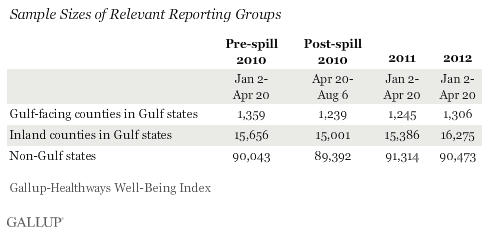
Florida Gulf Coast-facing counties included Escambia, Santa Rosa, Okaloosa, Bay, Gulf, and Walton. Mississippi Gulf Coast-facing counties included Jackson, Harrison, Hancock, and Pearl River. Louisiana Gulf Coast-facing counties included Orleans, St. Bernard, Plaquemines, Jefferson, St. Charles, Lafourche, Terrebonne, St. Mary, Iberia, Vermilion, Cameron, and St. Tammany. Alabama Gulf Coast-facing counties included Baldwin and Mobile. Texas' Gulf Coast-facing county was Jefferson. The collection of coast-facing and inland counties in these states is weighted to ensure that they are demographically representative of these counties.
Interviews are conducted with respondents on landline telephones and cellular phones, with interviews conducted in Spanish for respondents who are primarily Spanish-speaking. Each sample includes a minimum quota of 400 cell phone respondents and 600 landline respondents per 1,000 national adults, with additional minimum quotas among landline respondents by region. Landline telephone numbers are chosen at random among listed telephone numbers. Cell phone numbers are selected using random-digit-dial methods. Landline respondents are chosen at random within each household on the basis of which member had the most recent birthday.
Samples are weighted by gender, age, race, Hispanic ethnicity, education, region, adults in the household, and phone status (cell phone only/landline only/both, cell phone mostly, and having an unlisted landline number). Demographic weighting targets are based on the March 2010 Current Population Survey figures for the aged 18 and older non-institutionalized population living in U.S. telephone households. All reported margins of sampling error include the computed design effects for weighting and sample design.
In addition to sampling error, question wording and practical difficulties in conducting surveys can introduce error or bias into the findings of public opinion polls.
For more details on Gallup's polling methodology, visit https://www.gallup.com/.
